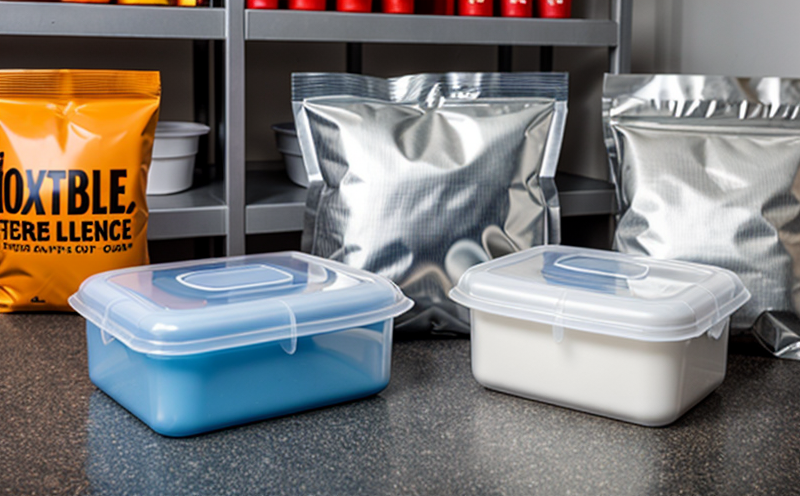ISO 22007-4 Thermomechanical Testing
The ISO 22007 series of standards is dedicated to the design and development of flexible packaging. Specifically, ISO 22007-4 Thermomechanical Testing provides essential guidelines for evaluating the mechanical properties of packaging materials under thermal stress conditions. This type of testing is critical in quality assurance processes because it helps ensure that packaging meets the required performance standards throughout various stages of its lifecycle.
The ISO 22007-4 thermomechanical test measures how a material behaves when subjected to temperature changes and mechanical forces simultaneously. It assesses both tensile strength and elongation at break, which are key factors in determining the durability and reliability of packaging materials used in industries such as food processing, pharmaceuticals, and consumer goods.
During this testing procedure, samples are exposed to controlled temperature fluctuations while being subjected to stretching forces until failure occurs. The resulting data helps manufacturers identify potential weaknesses in their products early on, allowing them to make necessary adjustments before mass production begins. By adhering to these international standards, companies can demonstrate compliance with regulatory requirements and enhance customer trust through consistent product quality.
One of the most significant benefits of ISO 22007-4 thermomechanical testing lies in its ability to predict long-term performance by simulating real-world conditions. This allows for more accurate predictions about how packaging will behave over time, helping prevent costly failures down the line. Additionally, this form of evaluation ensures that all components work together harmoniously during transportation and storage processes.
For those responsible for maintaining high standards within their organizations—whether they're quality managers overseeing production lines or R&D engineers innovating new designs—the importance of thorough testing cannot be overstated. With precise measurements provided by this methodology, decision-makers have reliable information at hand to guide critical choices regarding material selection and process optimization.
In summary, ISO 22007-4 thermomechanical testing plays an indispensable role in ensuring robust packaging solutions that meet both functional needs and regulatory expectations across multiple sectors. Its application not only enhances overall product quality but also supports sustainable practices by minimizing waste through optimized design iterations based on empirical evidence.
Industry Applications
The ISO 22007-4 thermomechanical testing method finds extensive use across various industries where flexible packaging plays a crucial role. Here are some key applications:
- Food & Beverage: Ensuring that containers maintain integrity during storage and transport.
- Pharmaceuticals: Verifying the stability of drug delivery systems under varying temperatures.
- Consumer Goods: Assessing the durability of retail packaging during shelf life.
- Pet Food: Guaranteeing that pet food pouches remain intact through various environmental stresses.
| Industry Segment | Main Concerns |
|---|---|
| Food & Beverage | Preserving freshness, maintaining hygiene standards, ensuring shelf life. |
| Pharmaceuticals | Ensuring drug stability, preventing contamination risks. |
| Consumer Goods | Promoting brand image through reliable packaging. |
| Pet Food | Avoiding spoilage during distribution. |
By implementing ISO 22007-4 thermomechanical testing, these industries can achieve higher levels of safety, efficiency, and consumer satisfaction. The structured approach provided by this standard ensures that every aspect of flexible packaging undergoes rigorous scrutiny, thereby fostering innovation while maintaining stringent quality control measures.
Why Choose This Test
Selecting ISO 22007-4 thermomechanical testing offers several advantages over other forms of evaluation:
- Precision & Reliability: Using internationally recognized standards guarantees consistent results across different laboratories.
- Compliance Assurance: Demonstrating adherence to industry best practices helps maintain regulatory compliance and builds stakeholder confidence.
- Informed Decision-Making: Provides detailed insights into material performance under realistic conditions, enabling informed decisions on design improvements.
This testing method goes beyond basic mechanical strength assessments; it evaluates how materials respond to temperature variations, which is particularly important given the increasingly stringent global regulations around food safety and environmental sustainability. By incorporating thermal elements into the assessment process, ISO 22007-4 ensures that packaging meets not only immediate functional requirements but also long-term performance expectations.
The rigorous nature of this test allows companies to identify potential issues early in the development cycle rather than discovering them later during production or after product release. Early detection enables manufacturers to address flaws promptly, reducing costs associated with recalls and rework while enhancing brand reputation through consistent quality assurance.
Moreover, compliance with these standards is becoming more critical as governments worldwide introduce new regulations aimed at improving public health outcomes and protecting the environment. Demonstrating adherence to such recognized guidelines can help organizations navigate complex regulatory landscapes smoothly and effectively.
Customer Impact and Satisfaction
The implementation of ISO 22007-4 thermomechanical testing has a direct positive impact on customers by ensuring that the packaging they receive is reliable, safe, and meets all necessary standards. Here’s how:
- Enhanced Safety: By verifying that packaging withstands temperature changes without compromising its integrity.
- Better Product Protection: Ensures that contents remain fresh and uncontaminated throughout their journey from manufacturer to consumer.
- Increased Brand Reputation: Consistent quality builds trust among consumers, leading to increased loyalty and repeat business opportunities.
For businesses operating in competitive markets, maintaining high levels of customer satisfaction is essential for long-term success. ISO 22007-4 thermomechanical testing contributes significantly towards achieving this goal by providing robust evidence that packaging meets stringent quality criteria.
In addition to these tangible benefits, there are intangible advantages as well. Companies that invest in such rigorous testing demonstrate their commitment to excellence and innovation, which can differentiate them from competitors who rely solely on conventional methods. This proactive approach not only enhances corporate image but also fosters stronger relationships with suppliers and partners by setting higher performance expectations.





